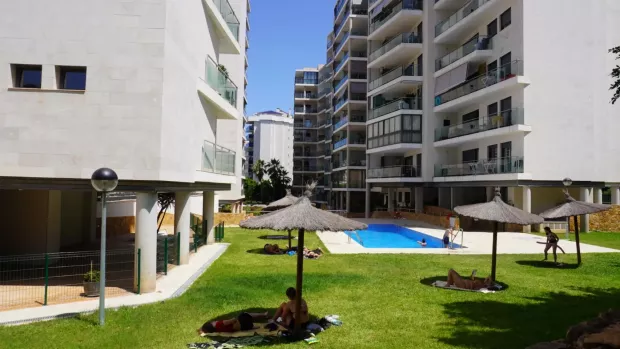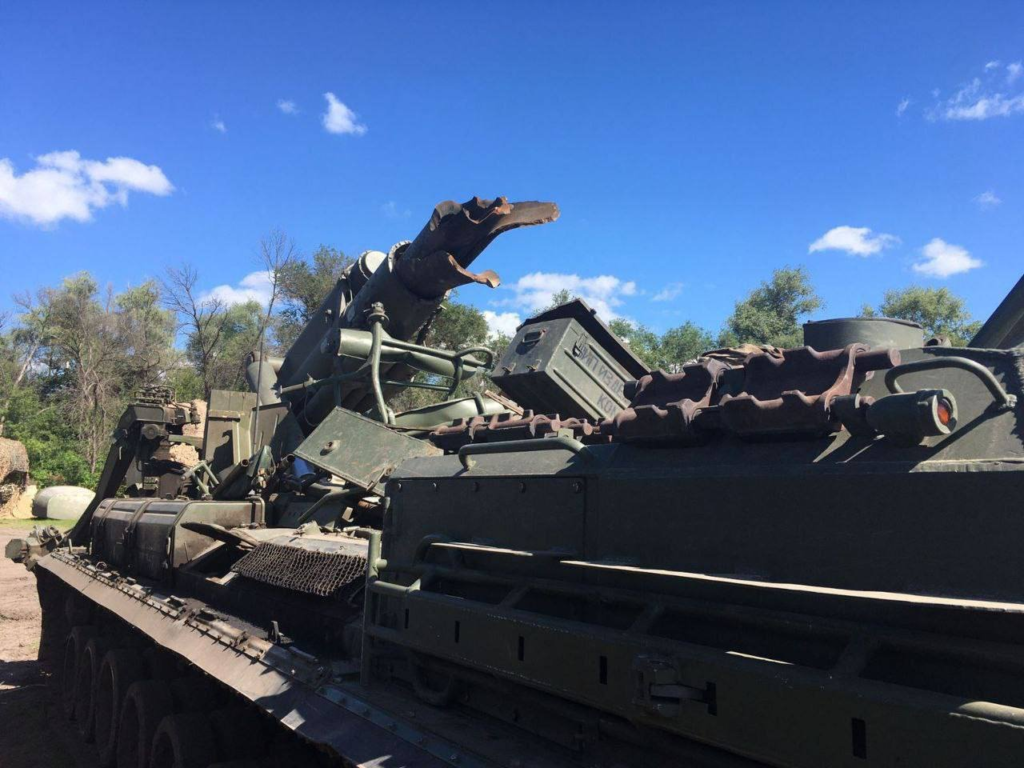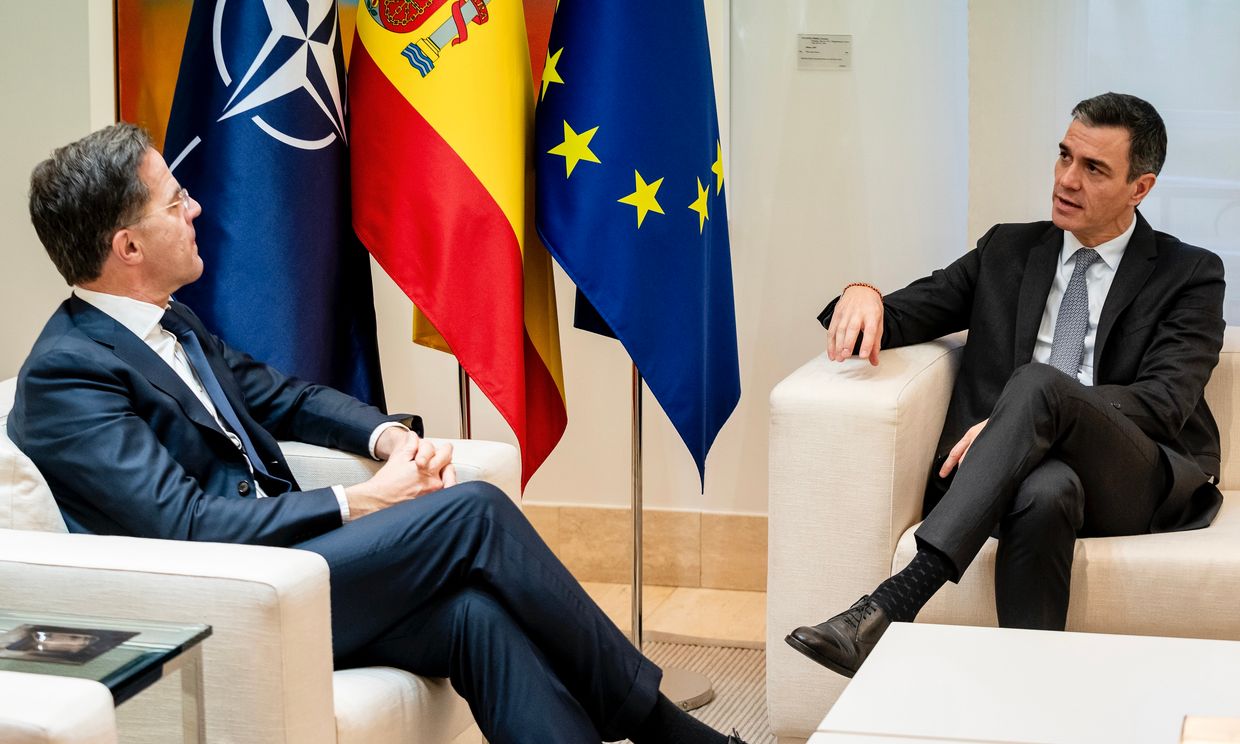England’s Lionesses Take ‘Football Home’ With Gripping Euro Win

© Fabrice Coffrini/Agence France-Presse — Getty Images


© Fabrice Coffrini/Agence France-Presse — Getty Images


© Thomas Coex/Agence France-Presse — Getty Images


© State Department


A former high-ranking Ukrainian police official has been found dead under mysterious circumstances in the same Spanish residential complex where Russian defector pilot Maxim Kuzminov was assassinated earlier this year, El Español reports.
Ihor Hrushevskyi, 61, a former senior official in Ukraine’s Interior Ministry’s Department for Combating Organized Crime, was discovered floating in a community pool at the Cala Alta residential complex in Villajoyosa on June 29. The death occurred just 503 days after Kuzminov’s murder at the same location.
According to El Español, Hrushevskyi was found “face down and without pulse” in what “appeared to be a drowning” around 9:30 pm. A Ukrainian neighbor and young people passing through the common areas discovered the body and attempted CPR, but “could not save his life,” the publication states.
The circumstances surrounding Hrushevskyi’s death have raised suspicions among residents. While the Ukrainian showed no signs of violence, he was bleeding from one ear, leading some to suspect a stroke. Others question how someone could drown in a pool that “does not exceed 1.50 meters in depth.”
Hrushevskyi had recently purchased an apartment in block 1 of the complex and was renovating it. His background in law enforcement remained largely unknown to neighbors – of approximately 20 residents consulted by El Español, “only one knew his name” and that he worked in organized crime fighting.
Ukrainian legal records show Hrushevskyi served as head and authorized representative of the Interior Ministry’s Department for Combating Organized Crime in the Cherkasy and Kirovograd oblasts in 1993. The department was officially dissolved in 2015 as part of police reforms aimed at “cutting corrupt practices” and aligning with European standards.
The location adds an unsettling dimension to the death. Kuzminov, the Russian helicopter pilot who defected to Ukraine with a sophisticated Mi-8 combat helicopter in exchange for 500,000 euros, was “shot dead on 13 February 2024” in the complex’s garage. The pilot had been living under a false identity when Russian Foreign Intelligence Service agents tracked him down.
Of the “more than 3,000 kilometers separating Alicante from Ukraine,” both deaths occurred within meters of each other – “one in the garage and another in the pool,” El Español notes. Some residents fear this proximity may not be coincidental, particularly given that Russian President Vladimir Putin “used to vacation in his luxury refuge in Altea Hills” before the war and has contacts who “know the area perfectly.”
The Wall Street Journal later reported that the killers received payment from Russian officials in Vienna.


A global law enforcement campaign has dealt a blow to the pro-Russian cyber army known as NoName057(16). Europol confirmed that about 20 countries helped dismantle the network behind thousands of attacks on Ukraine’s supporters.
Europol reported that between 14 and 17 July, authorities from 12 countries launched Operation Eastwood. Europol and Eurojust coordinated the joint crackdown. The effort reportedly dismantled major parts of the pro-Russian cyber army’s infrastructure, including hundreds of systems.
Germany issued six arrest warrants for suspects based in Russia. Two are accused of leading the group’s activities. Spain issued another arrest warrant. France and Spain also reported one arrest each. All suspects are internationally wanted.
Authorities carried out 24 house searches and questioned 13 individuals across Europe. In Spain alone, 12 searches took place. Investigators also notified over 1,000 individuals believed to support the cyber group. Fifteen of them were administrators.
Other attacks struck during the European elections. Swedish government and banking websites were affected. In Switzerland, NoName057(16) launched attacks in June 2023, during a speech by Ukraine’s president to the Joint Parliament. Another wave occurred in June 2024 during the Peace Summit for Ukraine at Bürgenstock.
The most recent attack linked to the group targeted the NATO summit held in the Netherlands in June 2025. Europol notes that although the attacks caused disruption attempts, none led to substantial outages.
Europol identifies NoName057(16) as an ideological cyber network that operated without formal leadership. The group recruited mostly Russian-speaking sympathizers, many with little technical knowledge. Its structure relied heavily on gamified propaganda and incentives.
Volunteers received cryptocurrency payments and recognition through online shout-outs, badges, and leaderboards. Europol notes this method especially appealed to younger users who felt emotionally involved in Russia’s political narratives.
To simplify participation, NoName057(16) distributed guides and tools like DDoSia. Europol also launched a prevention campaign warning suspected supporters of their criminal liability, delivered via the same communication platforms.


© Violeta Santos Moura/Reuters


© Finbarr O'Reilly for The New York Times


If not for a Spanish company, Russia could have run out of new artillery barrels. Barcelona-based Forward Technical Trade SL supplied at least one radial forging machine to Russia, initially built by the Austrian firm Gesellschaft für Fertigungstechnik und Maschinenbau (GFM), the Insider reports.
Since early 2024, Ukraine has destroyed over 19,000 Russian artillery systems, contributing to a total loss of nearly 30,000 systems over the entire war. The attacks have reduced Russia’s artillery superiority from a 10:1 ratio to about 2:1. Meanwhile, Kyiv and Moscow are turning to drones for faster, more precise strikes, reshaping how the war is fought.
The equipment, valued at $1.3 million, weighs 110 tons and was manufactured in 1983. The transfer reportedly occurred via a Hong Kong-based intermediary, Scorpion’s Holding Group Limited.
GFM denies any direct business ties with either the Spanish supplier or the Hong Kong firm. However, the UK’s Royal United Services Institute (RUSI) confirms that GFM machines are crucial for barrel manufacturing in Russia — and that the Russian defense industry remains entirely dependent on them.
According to US-based expert Pavel Luzin, Russia cannot produce these forging machines domestically. Facing severe shortages, Russian forces have already begun “cannibalizing” old Soviet stockpiles, endangering frontline performance.
Earlier, Ukraine’s Defense Intelligence reported that the West still had not sanctioned 70 Russian companies behind the production of missiles that struck Kyiv’s largest children’s cancer hospital.
The Okhmatdyt strike occurred the same day Indian Prime Minister Narendra Modi met with Russian President Vladimir Putin in Moscow on 8-9 July 2024, calling for a peaceful resolution to the war. While the two leaders spoke of peace, Russian missiles rained down across Ukraine, killing 47 people, including 33 in Kyiv.

Technology is Ukraine’s chance to win the war. This is why we’re launching the David vs. Goliath defense blog to support Ukrainian engineers who are creating innovative battlefield solutions and are inviting you to join us on the journey.
Our platform will showcase the Ukrainian defense tech underdogs who are Ukraine’s hope to win in the war against Russia, giving them the much-needed visibility to connect them with crucial expertise, funding, and international support. Together, we can give David the best fighting chance he has.
Join us in building this platform—become a Euromaidan Press Patron. As little as $5 monthly will boost strategic innovations that could succeed where traditional approaches have failed.


© Idriss Bigou-Gilles/Agence France-Presse — Getty Images


Spain has rejected a U.S.-backed proposal for NATO members to raise defense spending to 5% of GDP, becoming the first alliance country to oppose the plan, Reuters reported on June 19.
The rejection adds pressure to the transatlantic debate ahead of the NATO summit in The Hague on June 24–25, which has beenreduced to a single session focused on defense spending and alliance capabilities.
In a letter to NATO Secretary General Mark Rutte, Spanish Prime Minister Pedro Sanchez called the proposed target "unreasonable" and warned it would undermine broader European efforts to build an integrated defense ecosystem.
"Committing to a 5% target would not only be unreasonable, but also counterproductive," Sanchez wrote, arguing it would "move Spain further away from optimal spending."
Spain estimates that its armed forces require spending equal to 2.1% of GDP to meet national military objectives, below the U.S.-endorsed threshold but above NATO's 2% benchmark.
U.S. President Donald Trump has repeatedly accused NATO members of underfunding their militaries, pushing for raising defense spending benchmark to 5% of GDP.
While no other NATO members have formally rejected the proposal, most have remained noncommittal. Poland, the Netherlands, and Sweden have expressed willingness to consider the 5% target.
In 2024, only 23 alliance members met the 2% target, according to NATO estimates. Poland was ahead of all members with 4.12% of GDP allocated to defense, followed by Estonia (3.43%) and the U.S. (3.38%).
Rutte said on June 17 that all NATO countries are on track to meet the 2% threshold in 2025.
Spain, governed by a Socialist-led coalition, maintains a sharply different defense posture than the U.S. administration.
While Madrid supports Ukraine, it has taken a more cautious stance on the Middle East, including distancing itself from U.S. policy on Israel.
 The Kyiv IndependentDmytro Basmat
The Kyiv IndependentDmytro Basmat